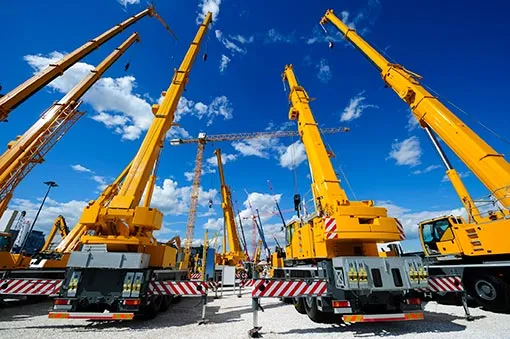Are you considering rent a crane for you construction? Well renting a crane would prove to be a significant decision in any form of construction. From lifting heavy materials and putting up structures to routine maintenance work, the right choice of crane is indispensable to both safety measures and attaining work efficiency and cost reduction. With the array of choices available, key things will have to be considered before the selection is made. These are the following:
1. Type of Crane Needed
Different types of cranes are available at crane rental, each with its own specific features to best suit varied project requirements. A number of the common cranes are:
- Mobile cranes: Versatile and fit for any job site, mobile cranes bring about mobility and flexibility.
- Tower cranes: Fitting for high construction projects, these cranes come with high lifting capacity and stability.
- Crawler Cranes: These are best for rough conditions due to their stability and even travel in tough terrains.
- Telescopic Cranes: They find useful application for wide reach and universal approach due to the power of extended boom.
- Overhead Cranes: These find great application in industries and construction jobs since they are highly efficient in lifting heavy loads and shifting those within a fixed region.
Select the type of crane that could satisfy the needs and constraints of your project.
2. Site Conditions for the Project
Establish the conditions on your project site to check the selected crane’s suitability. Conditions of the terrain, ground stability, space availability, and overhead obstructions also need to be considered. For instance a mobile or a crawler crane, which is compact and movable is a better choice than a tower crane for your project site. If it is of limited access or is located on a ground with a slope or variance. Understanding site conditions helps eliminate operational challenges and upgrade safety during crane usage.
3. Safety features and compliance
Safety is a priority if one rents and operates a crane. Ensure that the crane in question is in line with all the related security standard regulations set forth by the related authorities. Make sure that the following about the crane:
- Crane’s capacity
- Crane’s load
- Crane’s stability
It is also important to look at other safety features, such as:
- An anti-overload protection system
- Anti-collision equipment
- Emergency stop devices
Ensure that the crane operators have, in addition to that, been well trained and are also certified to operate the machinery securely. Always prioritize safety before anything else to avoid accidents and cases of injuries at the site.
4. Cost and Rental Terms
Consider the cost and terms of renting the cranes. Compare the prices of different rental providers against their overall value. In addition to the base rental rate, check on the extra transport cost, set-up, operating, and maintenance costs. Look through the rental agreement to grasp the set terms and conditions, including insurance cover, liability, and rental period. A rental company would be chosen based on whether its pricing is competitive terms open and it provides good support.
5. Maintenance and Support Services
Ensure that the crane rental company provides reasonable maintenance and support during rental. The maintenance is essential for ensuring the crane can function normally, free of breakdowns or malfunctions. Ask about schedules for maintenance, on-site support, and availability of assistance in case of an emergency. A company whose customer service is responsible and has a name to be preserved guarantees reliability and professionalism. A well-maintained crane minimizes downtime and enhances project productivity.

